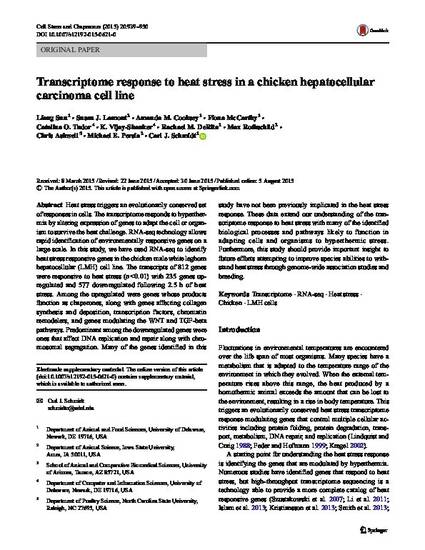
Heat stress triggers an evolutionarily conserved set of responses in cells. The transcriptome responds to hyperthermia by altering expression of genes to adapt the cell or organism to survive the heat challenge. RNA-seq technology allows rapid identification of environmentally responsive genes on a large scale. In this study, we have used RNA-seq to identify heat stress responsive genes in the chicken male white leghorn hepatocellular (LMH) cell line. The transcripts of 812 genes were responsive to heat stress (p < 0.01) with 235 genes upregulated and 577 downregulated following 2.5 h of heat stress. Among the upregulated were genes whose products function as chaperones, along with genes affecting collagen synthesis and deposition, transcription factors, chromatin remodelers, and genes modulating the WNT and TGF-beta pathways. Predominant among the downregulated genes were ones that affect DNA replication and repair along with chromosomal segregation. Many of the genes identified in this study have not been previously implicated in the heat stress response. These data extend our understanding of the transcriptome response to heat stress with many of the identified biological processes and pathways likely to function in adapting cells and organisms to hyperthermic stress. Furthermore, this study should provide important insight to future efforts attempting to improve species abilities to withstand heat stress through genome-wide association studies and breeding.
Available at: http://works.bepress.com/susan_lamont/102/

This is an article from Cell Stress and Chaperones 20 (2015): 939, doi:10.1007/s12192-015-0621-0. Posted with permission.